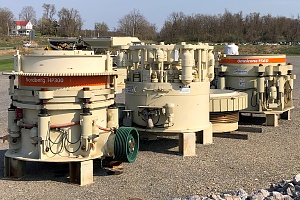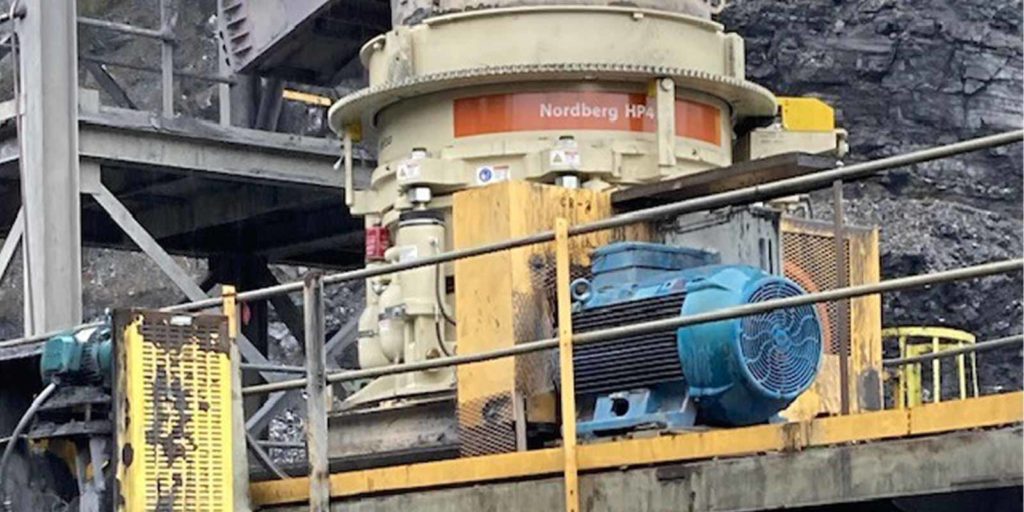There are two main types of crushers: gyratory crushers and cone crushers. While both types can be used for general crushing purposes, they each have unique benefits and drawbacks that make them better suited for specific tasks.
Gyratory and cone crushers are important pieces of equipment in the mining and aggregate industries. They are both used to break down large rocks into smaller ones. Gyratory crushers are commonly used in mines where larger rocks need to be broken down into smaller pieces. Cone crushers are typically used in quarries where smaller rocks need to be reduced to gravel or sand.
What Are Gyratory Crushers?
Gyratory crushers are used in the mining and construction industries. They are similar in appearance to cone crushers, but they have a larger crushing chamber and operate at higher speeds.
Gyratory crushers are normally used as primary crushers, meaning that they break the largest rocks down into smaller pieces. They are ideally suited for this task as they can produce a more uniform size product than a cone crusher. Gyratory crushers are also more robust than cone crushers, making them better suited for crushing harder materials.
What Are Cone Crushers?
Cone crushers use pressure to break up materials. They have a conical shape, with the point of the cone being the smallest part. This allows them to work well on materials that are smaller than those that gyratory crushers can handle. Additionally, cone crushers can be adjusted to different sizes to better match the requirements of the materials being crushed.
Cone crushers are more commonly used as secondary crushers, meaning that they crush smaller rocks after the larger rocks have been broken down by a gyratory crusher. This makes them ideal for industrial applications where smaller parts need to be recycled or reused.
Differences Between Gyratory and Cone Crushers?
 Gyratory crushers are usually used for larger rocks, while cone crushers are typically used for smaller rocks. Additionally, gyratory crushers can handle larger feed sizes and offer more throughput than cone crushers. However, cone crushers are more efficient and can produce a finer product.
Gyratory crushers are usually used for larger rocks, while cone crushers are typically used for smaller rocks. Additionally, gyratory crushers can handle larger feed sizes and offer more throughput than cone crushers. However, cone crushers are more efficient and can produce a finer product.
Cone crushers also tend to be more compact than gyratory crushers, making them better suited for smaller operations. Gyratory crushers also require more maintenance and have higher operating costs.
Gyratory crushers are larger than cone crushers, though, and can achieve a higher throughput due to their higher mantle speed. However, their functionality is limited to crushing large rocks, whereas cone crushers can also be used for secondary and tertiary crushing of smaller rocks.
How to Choose the Right Type of Crusher for Your Next Project
When choosing between a gyratory and cone crusher, there are several factors to consider. The two machines have different crushing mechanisms, so each has unique benefits and drawbacks.
- Gyratory crushers are better for larger materials crushing.
Gyratory crushers are better at crushing large boulders while cone crushers are better at handling smaller rocks.
- Cone crushers are more affordable.
Gyratory crushers tend to be more expensive but can crush more material in a single pass. Cone crushers are less expensive and require more passes to achieve the same level of crushing.
- Cone crushers can handle a wide variety of materials.
Cone crushers are better suited to use in projects where the materials are more diverse and smaller. This is because of the unique crushing mechanism they use that helps to produce finer materials.
So, if you are looking for a powerhouse machine that can crush larger materials more easily, a gyratory crusher is a much better choice. One of the key differences between these two types of crushers is their crushing action. Gyratory crushers use a circular motion to crush rocks while cone crushers use an elliptical motion.
Conversely, if you’re working with smaller rocks or need greater mobility and versatility, a cone crusher may be a better choice for you. Cone crushers are also often more affordable than gyratory crushers.
Trust the Aggregate Experts at Mellott To Help You Choose The Right Equipment
If you’re still unsure which type of crusher is right for your next project, contact the aggregate experts at Mellott today for advice on what crusher is right for your unique needs. They can help you choose the right crusher for your specific application and ensure that you get the most out of your investment. Reach out to their team today at (855) 554-1606.

